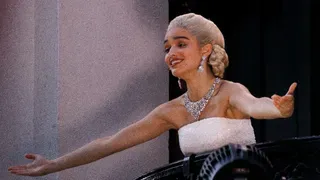December 17, 2015
The Fall of the House of Usher
Philip Campbell READ TIME: 3 MIN.
The San Francisco Opera's fall season ended last week with a brief four-performance run of an intriguing double bill, "The Fall of the House of Usher."
Two one-act operas based on Edgar Allan Poe's disturbing story of ancestral madness and decline were presented in the U.S. premiere of Gordon Getty's "Usher House" and the American professional premiere of Robert Orledge's reconstruction of Claude Debussy's "La Chute de la Maison Usher."
The SFO co-production with Welsh National Opera of director David Pountney's evocative 2014 Cardiff staging arrived too late for Halloween, but it wasn't poor seasonal timing that made this re-imagining of Poe's gothic tale a confusing disappointment. The ingredients were promising enough. The ambitious reshaping of Debussy's original failed attempt into something stageworthy for a modern audience, and the offer of a contrasting interpretation from a living composer seemed genuinely exciting.
The brilliant production team alone might have spelled success. Unfortunately, even after some judicious tweaking since the Welsh debut (talk about your out-of-town tryouts), "The Fall of the House of Usher" was dead on arrival at the War Memorial Opera House. Not so much a complete flop as a frustrating mediocrity, the inert double bill simply didn't deliver the goods.
Gordon Getty must be respected for his continuing attempts at showing his operatic mettle. He is honestly dedicated, and while he is often accused of dilettantism due to his enormous wealth, he has never proved less than sincere in his compositional career. "Usher House" vindicates his intelligent intentions, aiming to illuminate an elusive mystery with fresh psychological insight.
Using his own libretto, Getty rather ingeniously changes the story's narrator to Edgar Allan Poe himself. It almost works, but cannot surmount the tedious tread of the musical score. The word-heavy text is rarely lyrical, and dramatic weight is only supplied by increasingly predictable orchestral outbursts. Snatches of melody can be heard in the dance music and a ballad that passes as the opera's only recognizable aria. Getty freely admits to being old-fashioned, but that doesn't help much if the tunes are bland.
The performers certainly had their work cut out for them, and they soldiered on without much hope of a victory. If sheer stamina is considered a win, however, baritone Brian Mulligan, as the central character Roderick Usher (in both operas), braved the vocal demands with admirable strength. His impassioned acting added necessary focus, and, despite some occasional strain, he made a memorable impression.
American tenor Jason Bridges, in his SFO debut, was also effective. As Poe (called "Eddie" by Roderick), his portrayal of the hapless guest of the family was believably afraid and confused.
The role of Madeline Usher was danced onstage (a clever touch) by Jamielyn Duggan (SFO soloist debut). She made the most of the suitably spooky choreography by Jo Jeffries (another SFO debutante).
Madeline was ethereally sung offstage by current Adler Fellow Jacqueline Piccolino. She returned in the Debussy to sing the doomed sister onstage. Both performances demonstrated the excellence we have come to expect from her other SFO appearances.
The reams of sketches and drafts left by Debussy after years of tortuous tinkering have been re-fashioned in fragmentary form before, but musicologist Robert Orledge has gone so far as to make an hour-long pastiche that includes some "original" composition (Debussy-based) and re-orchestration. The spirit and sound world of the composer we revere from Pelleas et Melisande is apparent at the beginning, but it doesn't take long before the initial fascination wears off. The action is static until the terrifying conclusion. We may appreciate the dreamy (but gorgeous) longueurs of Pelleas, but there was some squirming and nodding as Orledge's determined concoction unfolded.
The reliance on monologues proved compelling as long as Brian Mulligan was singing them, and any shavings from Debussy's bench deserve preservation, if only as a curiosity. The singers and orchestra followed conductor Lawrence Foster's careful direction with praiseworthy professionalism. Current Adler Fellow Edward Nelson as L'Ami (friend of the weirdo clan) was sympathetic, and tenor Joel Sorensen added authentic scariness as the nasty Le Medicin.
Mostly, "The Fall of the House of Usher: A Double Bill" commanded our attention visually. The breathtaking production design by Niki Turner, atmospheric lighting by Tim Mitchell, and the astonishing video projections by David Haneke (all making their SFO debuts) furnished desperately needed allure to a theatrical experience that, frankly, might have worked better in a simple concert format.






